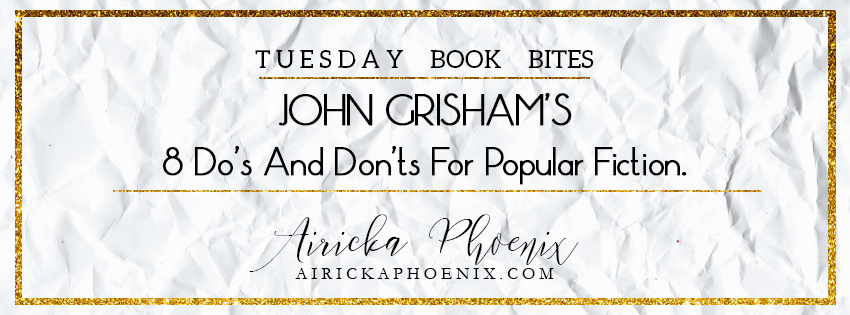
John Grisham’s 8 Do’s And Don’ts For Popular Fiction

My name became a brand, and I’d love to say that was the plan from the start.
But the only plan was to keep writing books.
And I’ve stuck to that ever since.
I especially love when they do something I do as well. Not because I feel like that makes us the same, or that somehow we’re besties now (unless it does, because that would be crazy cool!) But because it makes me feel like I am *maybe* doing something right and in any line of work you’re truly passionate about, that’s seriously a huge deal. It’s a sense of relief.

Writing’s still the most difficult job I’ve ever had, but it’s worth it.
So, a few days ago, I came across a few different author tips on Twitter and a few different website (YAY Google!) and I want to share them with you, along with my own personal notes. I know I’m not as epic as some of these authors, but maybe something I do differently might help someone in their creation. All advice is take or leave, and always remember that not every idea/suggestion/advice works the same for everyone so experiment, try different things, just never give up! 😌
SIDE NOTE: I don’t own author interviews. Links to interviews will be provided at the end.
If you check them out, please take a second to like/follow and leave a comment to show your love.
Also, I don’t own, or pretend to own the author photos in the above graphics.
John Grisham’s 8 Do’s And Don’ts For Popular Fiction
1. DO — WRITE A PAGE EVERY DAY
That’s about 200 words, or 1,000 words a week. Do that for two years and you’ll have a novel that’s long enough.
Nothing will happen until you are producing at least one page per day.
ME: I’m 100% behind this. Good day or bad, I try to get at least 1,000 words on paper. It might not seem like a lot at first glance, but it really makes a difference in the long run and that’s what’s important.
2. DON’T — WRITE THE FIRST SCENE UNTIL YOU KNOW THE LAST
This necessitates the use of a dreaded device commonly called an outline. Virtually all writers hate that word. I have yet to meet one who admits to using an outline.
Plotting takes careful planning. Writers waste years pursuing stories that eventually don’t work.
ME: I know a lot of authors suggest an outline (myself included). Outlines save you massive headaches later on. Plus, they help when you’re doing an interview, or have to go back and recall a certain scene for the next book (if you’re writing a series). I also know a lot of authors who are fly-by-the-seat-of-your-pants and their books come out phenomenal. I’ve done both and I always prefer outlining. I feel like it really opens you up to the plot and characters, which is so important when trying to sell both to the reader.
3. DO — WRITE YOUR ONE PAGE EACH DAY AT THE SAME PLACE AND TIME
Early morning, lunch break, on the train, late at night — it doesn’t matter. Find the extra hour, go to the same place, shut the door.
No exceptions, no excuses.
ME: I agree with this (see #2), but to a point. Let me explain (without making excuses).
I work graveyard shifts. So, I go to work when my kids go to bed and I get home fifteen minutes before they wake up to go to school. Once they’re gone and I have the house to myself, I’m bloody tired. I couldn’t even spell my own name if I wanted to. So, I sleep while the kids aren’t home, because when they get home, I want to spend time with them, make dinner, and get ready for another long overnight shift. When I get to work, I get one fifteen and one half hour break which changes each night and that is when I do my writing with a million interruptions, lost thought processes, and restarts. So, yes, find a time, somewhere quiet and get words in. Yes, if your writing is important to you, you need to bust your butt to make it happen (like anything else in life). Just do your best, because that’s really all you can do.
4. DON’T — WRITE A PROLOGUE
Prologues are usually gimmicks to hook the reader. Avoid them. Plan your story and start with Chapter 1.
ME: I’ve done this. When I first released Touching Smoke, prologues were all the rage. Every author and their … mothers? were dropping ominous prologues into their books. I learned later (through a poll I asked my readers to take) that about 73% don’t even bother and go straight to chapter one. So, there you have that.
5. DO — USE QUOTATION MARKS WITH DIALOGUE
Please do this. It’s rather basic.
ME: Uh, I’m not even sure why this needs to be said, but yes, I agree with this. LOL.
6. DON’T — KEEP A THESAURUS WITHIN REACHING DISTANCE
I know, I know, there’s one at your fingertips.
There are three types of words: (1) words we know; (2) words we should know; (3) words nobody knows. Forget those in the third category and use restraint with those in the second.
A common mistake by fledgling authors is using jaw-breaking vocabulary. It’s frustrating and phony.
ME: I’ve seen this first hand. Authors put in words that look like someone face planted on the keyboard. Now, unless you’re writing a medical journal, chill. Lol. As a reader, I find it breaks the flow if I have to stop and look up the word.
7. DO — READ EACH SENTENCE AT LEAST THREE TIMES IN SEARCH OF WORDS TO CUT
Most writers use too many words, and why not? We have unlimited space and few constraints.
ME: I’m so bad for this so I find I can’t contribute an opinion until I’ve mastered my own word vomiting. LMAO!
8. DON’T — INTRODUCE 20 CHARACTERS IN THE FIRST CHAPTER
Another rookie mistake. Your readers are eager to get started. Don’t bombard them with a barrage of names from four generations of the same family. Five names are enough to get started.
ME: YES! So much yes to this. I actually stopped reading an amazing sounding book the other day because, five pages in, I had met eighteen different characters all with names that I couldn’t even pretend to pronounce and somehow all related to each other??? Maybe?? But yeah, gradual character reveal. lol.
Okay, so there’s this week’s #TuesdayBookBits. Do you have questions? Suggestions? Drop them into the comments below. I’d love to hear your take, your thoughts. And definitely check out the source link above.
So, until next time…



